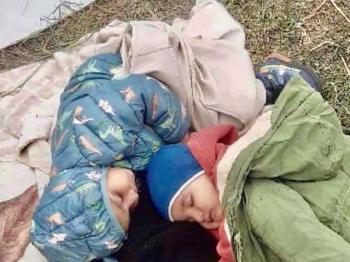An interview with Patrick Sookhdeo, International Director of Barnabas Fund, by Andrew Carey
It is the end of the West, Patrick Sookhdeo agrees as our Zoom call buffers and sputters. By this he means that a rules-based international order is an increasing rarity, but also that for the sake of peace, a strong alliance of Western forces is needed.
His involvement in Afghanistan goes back to 2005 when he began advising British and US military and NATO on Islamist terrorism. He lectured and advised the military for about ten years and served as a cultural adviser in Kabul and Kandahar in 2007/8 and 2010.
Historically, he says, it was well known that Afghanistan could never be held by an occupying power. He points out that British military leadership back in the nineteenth century had realised that Afghanistan is easy to conquer but next to impossible to hold. This had become such an axiom that Harold Macmillan’s words to Alec Douglas-Home in 1963, as the former handed over the premiership to the latter, are supposed to have included the advice, “My dear boy, so long as you do not invade Afghanistan you will be absolutely fine.”
Patrick reflects on his own Pashtun ancestry and says that his grandmother used to say that if a Pashtun sees blood, he’ll fight to the end.
The Taliban, and the Pashtun in particular, are experts in asymmetrical warfare. The reason they have managed to defeat the British Empire, the Soviet Empire and latterly an “American Empire” of sorts, is that they have “strategic patience”, says Patrick Sookhdeo. They will retreat, but they will always come back at you. And they are also experts at the irregular warfare which the terrain of Afghanistan lends itself so well to.
Patrick is International Director of the relief agency Barnabas Fund and has been organising support for Afghan Christians inside the country and newly escaped from it, thought to total over 1,000. I must declare an interest as an interviewer because he is a longstanding friend of mine and I have been a communications consultant to the Fund for some years. Patrick believes Christians are in great danger.
How are we in this position? When the allies attacked the Taliban in the wake of the September 11 attacks on America they never envisaged still being engaged two decades later. But Patrick takes us further back to the 1980s when the Soviets took over Afghanistan and, to win a Cold War victory, the US and UK armed the Mujahidin, with the support of General Zia ul-Haq of Pakistan, and the rest is history. Fighters from the Gulf states joined the Mujahidin and, after the Soviet retreat, the US and UK abandoned Afghanistan. This led to the fragmentation of the Mujahidin forces into Taliban and Northern Alliance, while, at the same time, Al-Qaeda began to emerge – all with weapons supplied by the West.

Now in 2021, with UK and US forces retreating, the Taliban have emerged the stronger party, and are armed with state-of-the-art weaponry and even a small air force, all captured in the last few days. Patrick fears that Afghanistan could again become a centre for exporting Islamist terrorism and their defeat of the US-led forces will give confidence to Islamist militants around the world.
Have the Taliban changed, though? This is my question because so many politicians in the West seem to be under the impression that they can do business with a “moderate Taliban”.
“The leopard doesn’t change its spots,” says Patrick Sookhdeo. “There is no moderate Taliban.”
He does believe, however, that there will not necessarily be uniformity across the country. In Kabul and the northern parts of the country where Uzbeks and Tajiks are in the majority it will take time for the Taliban to impose their control. In the South, they have already done so and there are even reports of the names of women and girls being registered by the Taliban. “The killings have already started,” he says.
What does the future hold, is there any hope, I ask? Patrick turns again to the immediate past, pointing out that the Taliban now have an unassailable grip on the country. Internationally, they had been given legitimacy by Qatar, and weapons and finance were channelled to them through the Gulf states. They have long had the support of the Pakistan military and intelligence service. Taliban commanders have always sought refuge and taken breaks in Pakistan’s hill resorts. In parts of Afghanistan they have in recent years created significant civilian infrastructure and been able to levy taxation and restore law and order, with no disruption from the Western allies. He believes that Russia will give “support” to the new Taliban government to avoid disruption in Central Asia. China has already given the Taliban international backing. And what will happen when the Taliban government turns up at the UN demanding recognition, he asks?
The success of the Taliban will therefore be seen widely as a defeat for the West and a further blow to the very idea of a rules-based international order. But Patrick’s immediate priorities are the Christian community in the country. They feel abandoned by missionaries who have fled from the invading forces and they have no visible support or spokespeople in the international community to stand up to them.
Barnabas Fund is working in great secrecy and danger to support Christian brothers and sisters in Afghanistan. But for the most part all we can do is pray.
This article will appear in the Church of England Newspaper on 20 August 2021.
Donate here to help Afghan Christians through Barnabas Fund.
Please write to your elected representative to ask your government to give refuge to Afghan Christians, who are in severe danger.

